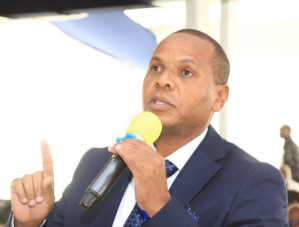
Religious leaders and legal experts have faulted a bill before Kenya’s Senate that proposes to regulate religious organisations. The Religious Organisations Bill, 2024, drafted by Tana River Senator, Danson Mungatana aims to regulate and oversee the management of religious organisations.
Religious leaders have taken issue particularly with some parts of the bill that forbid forcible or fraudulent evangelism, which could be misused to criminalize legitimate evangelism. Part VII of the draft prohibits anyone from converting or attempting to recruit into “their religion or convert any person from one religion to another by misrepresentation, force, undue influence or coercion.” It also criminalizes any attempt to recruit or convert a child from one religion to another without the consent of their parent or guardian.
Allan Jomba of Open Heavens Ministry said that pastors will be in trouble with the law if anyone under 18 years old attends church and is converted without the consent of the parents. “It also means that school gospel missions will be banned because if a student is preached to and gets converted and the parents decide to take you to court, you risk 5 years in jail or a Sh10 million ($78,000) fine,” said Jomba on a social media post.
Pentecostal Voices of Kenya, an umbrella body of independent pentecostal churches, opposed the bill arguing that some sections are ambiguous and that it infringes on the freedom of worship enshrined in the constitution.
The chair of the association, Apostle Peter Manyuru argued that Christian evangelism might be misrepresented as “coercion” as phrased in the bill. The body further said that it would be unthinkable for “the church to be overseen and managed by politicians.”
An office of the Registrar of religious organisations, which will be tasked with issuing, suspending or revoking the licenses, will be established by the proposed law. It also proposes a two-tier system to ensure compliance. A county executive committee member, who in most cases are political appointees, will liaise with the registrar to ensure enforcement of the provisions for religious organisations operating under their jurisdiction.
The bill proposes a Sh5 million ($38,800) fine, three years in jail or both for anyone who operates an unregistered religious organisation. It sets stringent requirements for applications to be considered including proof of at least 25 people who profess the same faith, endorsement by an umbrella religious organisation, a management staff where at least one religious leader has a degree, diploma or certificate in theology, among other requirements.
“The problem with this section is that it gives so much power to the county executive committee member in charge of social services and culture in a county. He/she can oversee elections, enforce good governance, and mediate disputes in religious organizations operating within their respective counties,” commented Cephas Doc, a Christian lawyer.
Senator Mungatana justified the regulation of religious organizations in Kenya following the discovery of hundreds of shallow graves in Shakhahola forest in Kenya’s South Coast in April 2023. The bodies, a majority of whom were children and women, were faithfuls of Good News International Church, a cult that coerced congregants to starve to death purportedly to purify themselves for eternal life. The church was led by Paul Mackenzie who is still in police custody together with other leaders.
“Many forget that the number of people who died in Shakhola exceeds the casualties in several terrorist attacks. The exact number of deaths is still unknown, with bodies continuing to emerge,” said Mungatana.
In a ‘memorandum of objects and reasons’ attached to the bill by Mungatana noted that Kenya has operated without religious regulation for a long time which has resulted “in the emergence of extremist and predatory religious organisations.” He argued that regulation is fragmented across different statues which makes enforcement difficult.
“There is therefore a need to enact a single all-inclusive legislation, a strong enforcement agency vested with sufficient resources to monitor the registration of religious organisations, their activities and their returns,” said Mungatana.
The draft bill comes weeks after a task force set up by Kenya’s president William Ruto recommended a hybrid religious organizations regulation framework. The report by the taskforce proposed a Religious Affairs Commission whose composition would be religious leaders and state officers. The commission will work in tandem with umbrella religious associations to strengthen self-regulation.
In July, Rwanda closed over 7,700 churches that had failed structural inspection standards while many were operating without a license in contravention to regulation that came into place in 2019.





